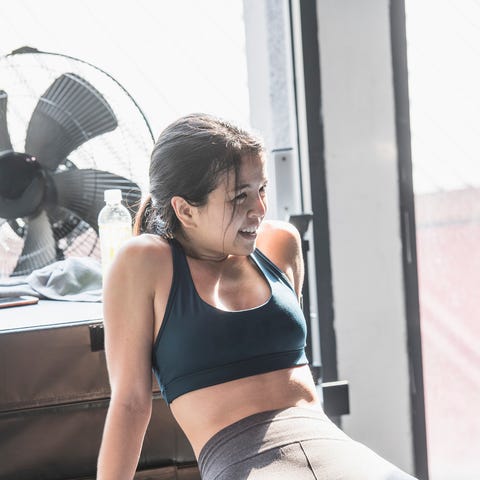IF YOU NEED TO COOL DOWN AFTER A RIDE AND AC IS NOT AN OPTION, THIS TIP CAN HELP STOP THE SWEAT.

- Fans are only effective at cooling you down in hot, humid conditions—in hot, dry conditions, they can actually make you feel hotter, a new study published in the Annals of Internal Medicine suggests.
- In a humid environment, you may sweat more. Fans speed up the evaporation process, which can help you feel cooler.
- Placing damp towels on your neck or body can mimic the evaporation process and can help you cool down.
You got through the hard part of your day—say, finishing a long ride when the sun is scorching—and now you just need to cool yourself down. But if you use an electric fan to do so, you might not be getting the benefit you think.
In fact, if you’re dealing with a higher heat index—a “hot and dry” situation—you may actually be putting your health at risk, a new study suggests.
Throughout a two-hour period, the participants had their core temperature monitored according to heart rate, blood pressure, whole-body sweat rate, and a measurement called “thermal strain,” which involves rectal temperature.
Researchers found that in a hot, humid condition, with a heat index of 132 degrees Fahrenheit, fans lowered core temperature and cardiovascular measures. But in a lower heat index condition of 114 degrees Fahrenheit in a drier condition, the fans proved detrimental instead of beneficial.
In that case, rectal temperature, heart rate, sweat rate, rate of dehydration, and overall comfort got worse. That means the fans actually made the participants hotter than if they hadn’t been sitting in front of them.
Lead researcher Ollie Jay, Ph.D., told Runner’s World that more research needs to be done to determine why, but it’s likely related to evaporation—as in, how the body handles lowering its core temperature through sweating. With more humidity, the body may sweat more and the fans can speed the evaporation process. But in a hot, dry condition, fans may prevent sweat, and that keeps your core temp climbing.
Jay added that paying attention only to a measure like a heat index or just overall is not enough to determine whether fans should be used or not. Instead, humidity should be taken into consideration, he said.
[Build a killer midsection in the kitchen for powerful, effortless miles on the road withEat for Abs!]
Now, the study does have some limitations, particularly the small sample size of only a dozen people. Also, the mean age of participants was 25, and included only healthy men, so it’s not known if core temperature changes would be the same for other groups. That’s a significant consideration, since the National Institutes of Health noted that heat can be more of a problem for seniors, those who are overweight or obese, have high blood pressure, or on certain medications.
Also, in terms of heatwave conditions—the kind that actually cause deaths—Jay is eager to emphasize that electric fans should absolutely be used if that’s the only way to try and create more cooling. Participants in the study only sat in front of the fans for two hours, but Jay suggested that during a heatwave, fans may cool the overall temperature of a room over several hours, which could be beneficial.
Limitations notwithstanding, you can use these findings to up your comfort when you’re a hot, sweaty mess after your workout. Getting to an air conditioned room is always a good option, but if that’s not possible, try this DIY trick: Placing damp, cold towels—with crushed ice wrapped inside if possible—around the neck, or wetting the arms, legs, and neck with cold water.
This promotes evaporation, which is what allows the body to shed excess heat at a faster rate. It’s also more effective than drinking cold water, he found in a previous study. Then get in front of the fan or a good wind, because the airflow will be working with the evaporation to speed heat loss, he said.
From: Runner’s World US